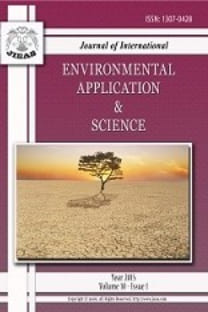Performance Evaluation of Skenderaj Wastewater Treatment Plant, Kosova
Skenderaj WWTP, evaluation BOD, COD, TSS, TDS, removal efficiency,
___
- APHA, (2005) Standard Methods for Examination of Water and Wastewater, 21st Edition, American Public Health Association, Washington, D.C. Corcoran E, Nellemann C, Baker E, Bos R, Osborn D, Savelli H, (2010) Sick Water? The Central Role of Wastewater Management in Sustainable Development, UN-HABITAT/UNEP/ Grid- arendal, The Hague. Delzer GC, McKenzie SW, (2003) Five-day biochemical oxygen demand, U.S. Geological Survey Techniques of Water-Resources Investigations, Book 9, chap. A7 (3rd Ed.), section 7. European Union, (1991) Council Directive 91/271/EEC concerning urban waste water treatment. European Commission, Brussels.
- Hach CC, Klein RL, Gibbs ChR, (1997) Introduction to Biochemical Oxygen Demand, Technical Information Series-Booklet No. 7. Horan NJ, (1990) Biological Wastewater Treatment System, John Wilet & sons Ltd. England.
- Koch M, Yediler A, Lienert D, Insel G, Kettrup A, (2002) Ozonation of hydrolyzed azo dye reactive yellow 84 (CI).Chemosphere, 46, 109-113.
- Mantzavinos D, Livingston AG, Hellenbrand R, Metcalfe IS, (1996) Wet air oxidation of polyethylene glycols; mechanisms, intermediates and implications for integrated chemical-biological wastewater treatment. Water Research, 51, 4219-4235.
- Metcalf & Eddy I, (2004) Wastewater Engineering, Treatment and Reuse. 4 ed. New York: McGraw- Hill.
- Qadir M, Wichelns D, Raschid SI, McCornik PG, Drechsel P, Bahri A, Minhas PS, (2009) The Challenges of Wastewater Irrigation in Developing Countries, Agricultural Water Management, 97, 561-568.
- Rao PV, (2005) Textbook of environmental engineering. Eastern Economy Ed., Prentice-Hall of India Private Limited, New Delhi, Chapter 3, 280.
- Sawyer C, McCarty P, (2002) Chemistry for Environmental Engineering. New York, New York: McGraw Hill.
- Tchobanoglous G, Schroeder ED, (1999) Water Quality Characteristics, Modeling and Modification, ADDISON-WESLEY Publishing Company.
- Tchobanologous G, Burton FL, Stensel HD, (2003) Wastewater Engineering Treatment and Reuse, 4th Edition, McGraw Hill, Boston, U.S.A.
- Templeton MR, Botler D, (2011) Introduction to Wastewater Treatment.
- Tjandraatmadja G, Pollard Ch, (2006) Literature review: Sources of critical Contaminants in domestic wastewater, National science agency, CSIRO, Australia.
- WHO, (2006) Guideline for drinking water quality. World Health Organization, 3rd Ed., Vol. 1, Recommendations, Geneva, Switzerland. WHO, (2006) Health Guidelines for the Use of Wastewater in Agriculture and Aquaculture, Report of WHO Scientific Group, Geneva.
- ISSN: 1307-0428
- Yayın Aralığı: Yılda 4 Sayı
- Başlangıç: 2006
- Yayıncı: Selçuk Üniversitesi
Vibrations in the Turning Process and the Curves Diagram Over the Estabilishment of Stability
Ahmet LATİFİ, İsmet IBİSHİ, Arsim ABAZİ, Astrit SHARTARİ
The Economic Cost of Dewatering of the “Hajvalia” Mine
Kemajl ZEQİRİ, Ferat SHALA, Musa SHABANİ, Rafet ZEQİRİ
Performance Evaluation of Skenderaj Wastewater Treatment Plant, Kosova
Nushe LAJÇİ, Milaim SADİKU, Xhemë LAJÇİ, Blerim BARUTİ, Mehush ALİU
Modelling of Synthetic Accelerograms for Locations in Kosovo
Shemsi Mustafa, D. Dojcinovski, G. WANG, Z. ELEZAJ
Ferdije Zhushi ETEMİ, Pajtim BYTYQİ, Valmir VİSOKA
Muharrem ZABELİ, Zarife BAJRAKTARİ-GASHİ, Bastri ZEKA, İsmet IBİSHİ
Optimization of the Process the Mixture of Copper ores for Melting the Analytical Method
Muharrem ZABELİ, Bastri ZEKA, Nurten DEVA
Nushe LAJÇİ, Milaim SADİKU, Xhemë LAJÇİ, Blerim BARUTİ, Mehush ALİU
New Records of Araschnia levana (Linneaus, 1758) (Lepidoptera: Nymphalidae) in Kosovo
